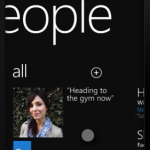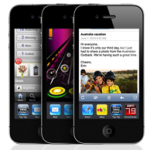Did Microsoft hand you a pink slip this week?

If the answer is "Yes," you were laid off, I'd like to tell your story. Please e-mail joewilcox at gmail dot com. I must confirm your identity, but your story will be anonymous to protect your severance package. I must reemphasize: All current or former employees' identities will be kept anonymous. Journalists protect their sources; I am especially protective of mine. You can speak freely, as did the former employees who shared their stories for my February five-part series.
I'm also looking for contractors who Microsoft recently sent packing. I've been hearing some strange things about Microsoft's use of contractors, such as the surprising number, the even more surprising number recently let go and that numerous employees sacked during the last round of layoffs returned as contractors in similar roles. I'd like to tell your story, too.
The Mobile Web is NOW (tough luck PCs)

The mobile Web isn't a future event. It's here today, at least in the United States, according to a 25-page report PEW Internet released this week. The study's findings are hugely significant to companies like Microsoft, which is largely invested in the PC, and Apple or Google, which embrace mobile devices and cloud services.
"Fifty-nine percent of American adults now go online wirelessly using either a laptop or cell phone, an increase over the 51 percent of Americans who did so at a similar point in 2009," according to the key findings. Some of the numbers will seem low, such as 38 percent accessing the Internet from their cell phones. Just the opposite: PEW looked more broadly at cell phones -- not just smartphones, which in other studies ranked higher for Internet and applications use. PEW captures demographic data that is startlingly revealing, though unsurprising. For example, 65 percent of 18-29 year olds access the Internet from their cell phones.
AT&T isn't capping 3G data uploads in my neighborhood

There was a whole lot of buzz over the last couple days about AT&T capping uploads over its 3G network. I decided not to post on the topic, because I had a pretty good idea why AT&T subscribers were seeing slower data uploads: The Fourth of July.
Let's use Occam's Razor for just a moment here. Is it more likely that data slowed down because of some grand AT&T conspiracy or that a larger number of people accessed the network over a long holiday weekend? Network congestion is more likely reason than evil, bastard AT&T executives conspiring to throttle down everyone's upload speeds. C`mon get a life, and a little common sense.
Sorry, Steve Jobs, search is happening on smartphones

Today, Compete put to shame Apple CEO Steve Jobs' ridiculous April assertion that "search is not happening on phones." According to the analyst firm, search is indeed happening on mobile phones, and, as I'll explain, it's one major reason why Android has a strategic competitive advantage over iPhone.
Compete announced release of its "Smartphone Intelligence" report, which I have requested copy (After I posted, a Compete spokesperson e-mailed that "we cannot send you the report." But Compete provided additional data that I later incorporated below). Compete asserts that during first quarter, Android and iPhone users discovered two or more new local businesses via search. The keyword is local.
5 things Microsoft should do to save Windows Phone

Friday's apocalyptic post "Windows Phone 7 is doomed" generated among comments assertions that I'm an idiot and demands that I be fired (Sorry, I'm a lowly freelancer). Nevertheless, I do read comments and seriously regard the ones written to extend the discussion (rather than just belittle the author or other commenters). Commenter rwalrond asked: "How about you write an article about how Microsoft can leverage its existing platforms to make WM7 a contender." Actually, Microsoft's trying to leverage its enterprise apps is part of the problem -- the Office and Windows hawks driving off the consumer and cloud service doves. But the spirit of rwalrond's comment is offering solutions, and that I will do here in response.
I don't want to open up a religious debate here, but the Biblical accounts of Nineveh and Sodom and Gomorrah are good metaphors for my "doom" proclamation and Microsoft's mobile future. In that context, I'll call my "Windows Phone 7 is doomed" assertion a prophecy. If Microsoft repents of its wicked ways, the company could end up like the Biblical account of Nineveh, which was spared destruction even after its doom was prophesied. The citizens of Sodom and Gomorrah didn't repent and, according to the Biblical account, they were burned with fire and brimstone. To reiterate: I don't want to open up a debate about God, the authenticity of the Bible or people's lifestyles (why these cities were targeted for destruction). I'm trying to say that Windows Phone 7 doesn't have to be doomed, if Microsoft is willing to radically change its behavior. I don't see much hope in that, particularly given how fast the mobile market is changing and how quickly upstarts Apple and Google are gaining market share and consumer and developer mindshare. So I'm sticking with "doomed," but hoping to be proved wrong.
Windows Phone 7 is doomed

In February, I asserted that Windows Phone 7 "is a lost cause." Matters are worse following this week's KIN killing and late May's Entertainment and Devices division reorganization. Microsoft mobile development has run aground, and at the wrong time. The company is poised to miss two crucial platform transitions that will doom its mobile strategy and assure that the Office-Windows-Windows Server applications stack will join the mainframe in gradual obsolescence.
There's irony here: Microsoft succeeded during the 1990s by driving platform changes that doomed competitors. Companies like Lotus and WordPerfect had market-leading products that fell away after they missed operating system changes that Microsoft lept on (and through its market dominating position helped push forward). Now it is Microsoft that will miss crucial platform changes: Smartphones replacing dumb phones and the mobile Web (including services and resident applications) diminishing the PC's computing and informational relevance.
What does it mean that KIN, Sidekick and Symbian-Guru went R.I.P. within about 24 hours?

The last 24 hours has brought remarkable upset to the mobile marketplace, just one week after Apple and its partners started selling iPhone 4. Will this tsunami never end?
Late yesterday, the blogosphere, twittersphere and news media cosmos burst with reports that Microsoft had killed KIN just six weeks after the consumer smartphone went on sale. Today, T-Mobile revealed that Sidekick sales stop tomorrow, which isn't exactly shocking considering KIN's demise. In early 2008, Microsoft bought Danger, which makes the software used by Sidekick.
Somebody notify the next of kin, Microsoft KIN is dead

Perhaps those rumors about iPhone going to Verizon are true. Microsoft is killing off KIN, just six weeks after putting the smartphone on sale. Microsoft launched the KIN -- its youth-oriented, consumer social networking smartphone -- in early April. Today, the company answered the question I asked on May 5: "Is Microsoft KIN stud or dud?" Somebody up the corporate decision tree decided the latter -- or perhaps that KIN isn't stud enough to share Verizon with iPhone. Concurrent with KIN's sudden death -- oh, baby, we hardly knew you -- Microsoft is shifting resources and personnel to Windows Phone 7.
Earlier today I asserted that iPhone 4's "Death Grip" launch "may rank among the top marketing fiascos of the 2010s." Microsoft already has one-upped Apple. KIN is a disaster of magnanimous proportions. In February 2008, Microsoft announced acquisition of Danger, which technology and resources were dedicated in part to KIN. Thereafter, Microsoft spent millions of dollars developing KIN, in two models, and bringing it to market. As recently as the weekend, I saw KIN commercials during prime-time programming; Microsoft invested in a massive marketing campaign, too.
5 ways to solve your iPhone 4 reception problems

Are you among the seemingly bazillions of new iPhone 4 owners who sound like a Verizon commercial: "Can you hear me now?" Ah, no, they can't hear you, buddy, and that's the problem. Apple's so-called iPhone 4 "Death Grip" -- where holding the phone in the left hand dampens the cellular signal -- may rank among the top marketing fiascos of the 2010s. This is not how Apple wanted to launch its fourth iPhone.
Strangely, and certainly not how Apple marketing executives planned, iPhone 4 is living up to marketing tagline: "This changes everything. Again." The original iPhone took away capabilities, like sending MMS messages, and held back others -- 2G data and calling when other handsets, and AT&T's network, supported 3G. The iPhone 4 takes back something more fundamental: The capability to make clear phone calls (OK not for all users in all circumstances but plenty enough to make Death Grip one of the hottest topics on the InterWebs this week).
12 people share their iPhone 4 Death Grip stories

Betanews readers have responded to my earlier-in-the day question -- "Are you caught in the iPhone 4 Death Grip?" -- with surprising answers. Some of you are having reception problems, and many others are not. Granted this is an unscientific survey, but several trends are still clear:
1. The reception problems aren't as widespread as blogs and news stories suggest.
Are you caught in the iPhone 4 Death Grip?

I am. But are you? I'd like to hear from iPhone 4 users about their calling experiences with the so-called "death grip." Please share your experiences in comments or by e-mail (joewilcox at gmail dot com). I'll collect reactions into a separate post. Do yourself a favor and respond. The more feedback Apple and AT&T receive, the better chances death grip can be resolved -- and there are problems. I only personally know about a half-dozen iPhone 4 owners, and all complain of some reception problem or another.
On June 23, I asked: "What's wrong with iPhone 4's antenna?" Only hours after receiving iPhone 4, I observed that the number of bars receded to zero over about 20-30 seconds when holding the device in my left hand. I wrote: "By appearances, the act of holding the phone impares signal strength. I'm not so bothered because I typically use a Bluetooth headset rather than hold a phone. Flat or holstered in a case are the handset's typical positions when used." Whoops, I'm having Bluetooth reception problems, too.
Apple and Microsoft stores are the future of technology retailing

People wait for the opening of the fourth Microsoft Store in San Diego
Move over Best Buy and Fry's. Smaller, specialized, tech company shops are the future -- not that this is news to retail experts. It "always has been," said Stephen Baker, "once consumers started driving technology and not enterprise." NPD's vice president of industry analysis should know; he sat in the front-row watching Gateway shutter stores about the time Apple opened them (2001) through the demise of Circuit City and CompUSA and broadening of Internet retail sales.
Which drew the bigger crowd in San Diego? Microsoft Store opening or Apple iPhone 4 launch?

Thousands of people swarm San Diego's Fashion Valley Mall Apple Store for iPhone 4
Apple and Microsoft faced off in the same San Diego mall today. Microsoft opened its fourth retail store. Apple launched iPhone 4. Both events drew long lines of fans. But the Apple line was ginormous by comparison, and the two groups were demographically quite different. To my bitter disappointment, Fashion Valley Mall management kept the Apple and Microsoft store lines far apart. I secretly hoped for a mixing of the two groups. Fanboy conflict would have made good news, and the combustion might have set off a mushroom cloud marking where San Diego once was.
What's wrong with iPhone 4's antenna?

The rumors are true: iPhone 4 signal strength wavers when the device is held in the hand. Isn't that like the typical position for holding a cell phone? I can confirm the behavior with the unit FedEx delivered about 3 hours ago. When the phone is flat down, I see four to five bars. When I hold the device in my left hand, the bars slowly go down until either there is one bar or "searching" appears on the screen.
I want to thank Justin Horn for bringing the problem to my attention. I had complained about "searching" behavior on Twitter. He posted: "Is the new iPhone 4 antenna design causing signal issues?" Gizmodo has crowdsourced the story, getting readers to confirm the declining bars scenario; good for Giz practicing some fine "process journalism."
Apple revenue will likely top Microsoft during Q2

Second quarter is just days from finishing. In the home stretch, could Apple generate enough revenue to top Microsoft? Strong iPhone and, particularly, iPad sales should make the difference. Apple's ascension and Microsoft's descension would mark a turning point in computing eras. Microsoft represents the past -- PCs tied to the Office-Windows-Windows Server applications stack. Apple represents the future: mobile devices and applications connected to the cloud.
I have raised the Apple-overtaking-Microsoft-revenue topic before -- 10 days ago when Apple announced 2 million iPad shipments and on April 23, after both companies announced first-quarter earnings. Yesterday, Apple announced that it had sold -- parlance for shipped -- 3 million units, or another 1 million units in the previous 9 nine days. At that rate, Apple could conceivably add another 500,000 units before quarter's end. I'd say 1 million, but tomorrow's iPhone 4 launch almost certainly will be friction against iPad, if no other reason than how busy Apple retail stores will be.
Joe's Bio
Joe Wilcox is BetaNews executive editor. His motto: Change the rules. Joe is a former CNET News staff writer, JupiterResearch senior analyst, and Ziff Davis Enterprise Microsoft Watch editor.
Ethics StatementBetaNews, your source for breaking tech news, reviews, and in-depth reporting since 1998.
© 1998-2025 BetaNews, Inc. All Rights Reserved. About Us - Privacy Policy - Cookie Policy - Sitemap.
